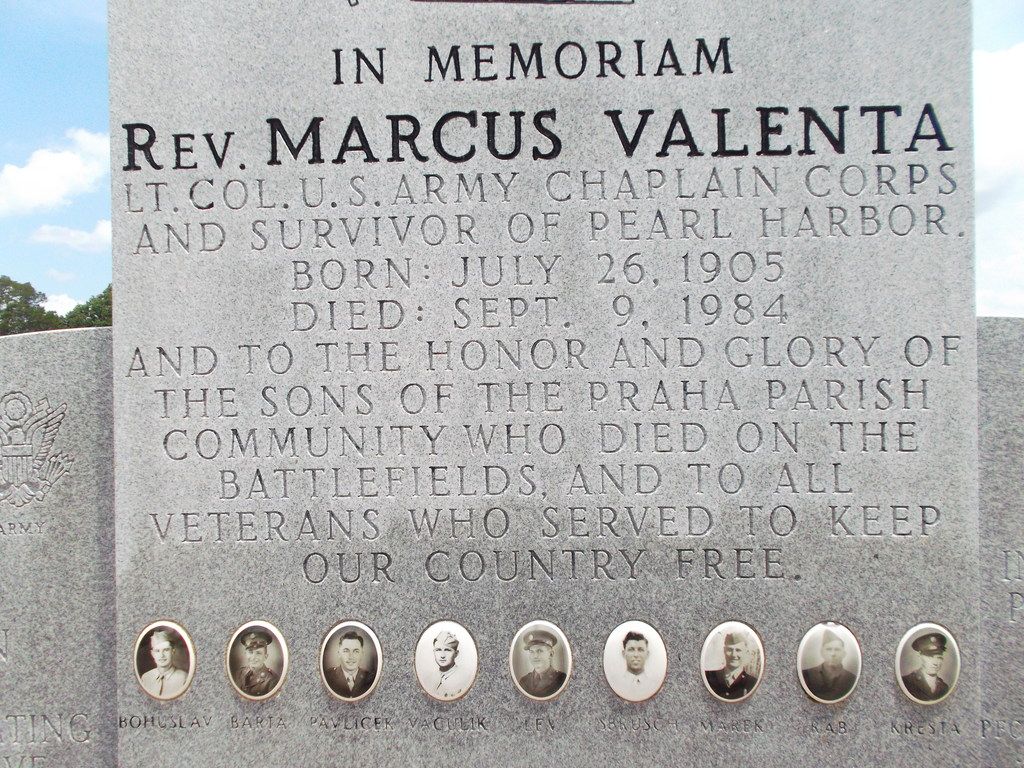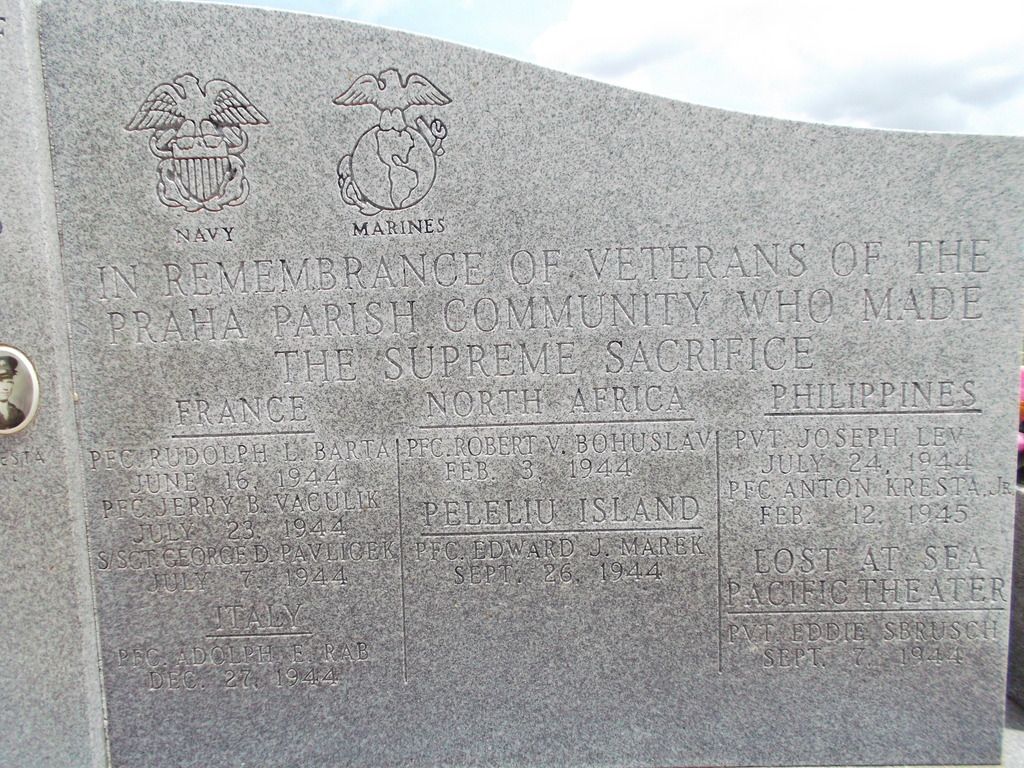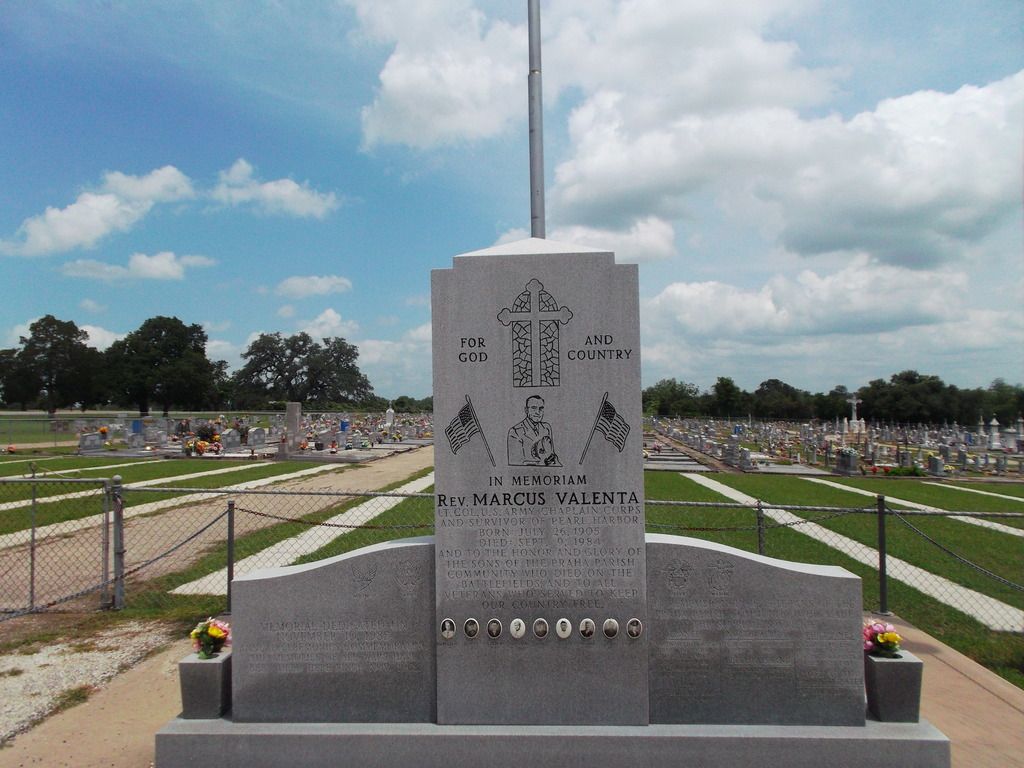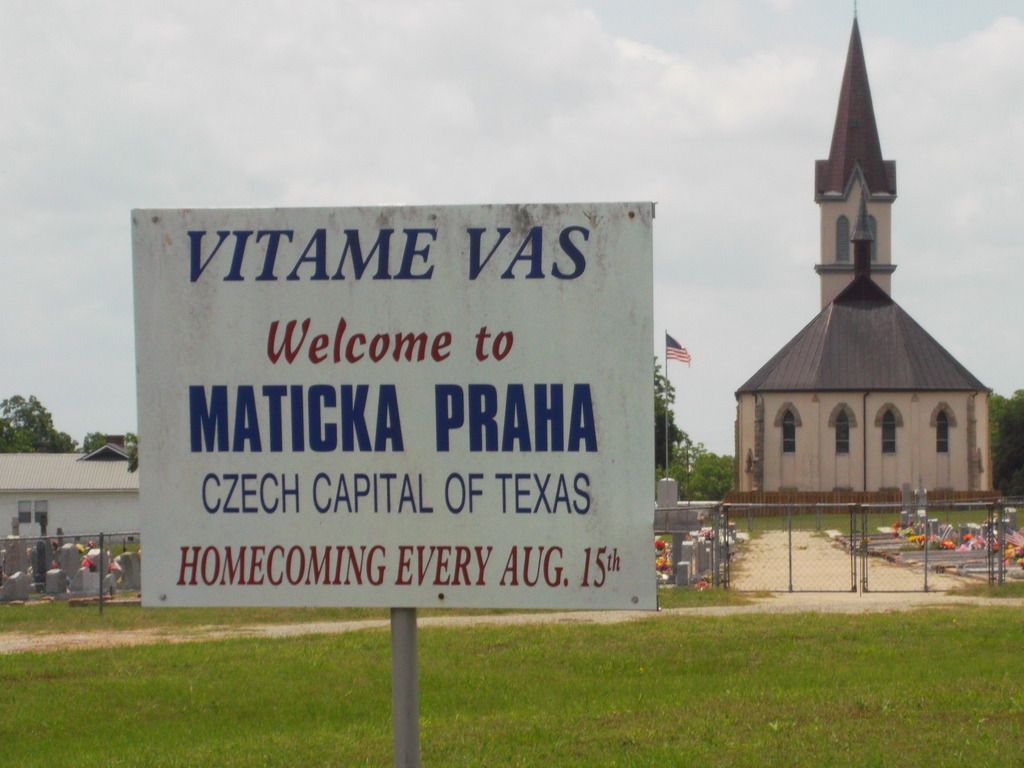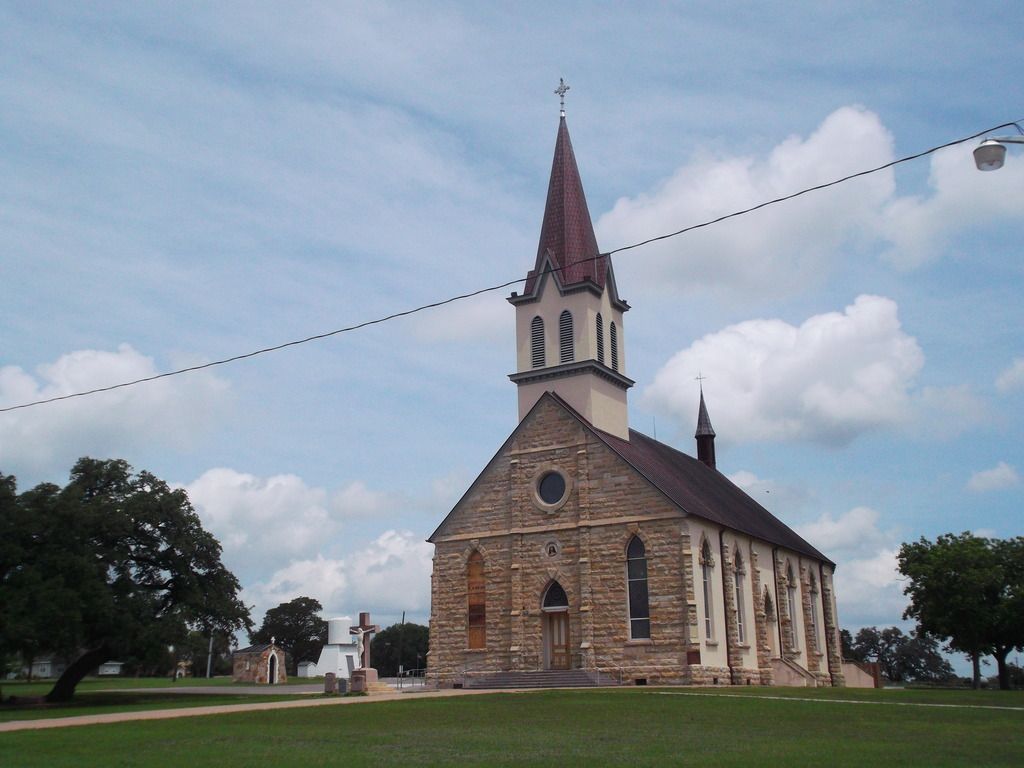Praha (Prague), Texas is a very small community of about 50 people these days. Many Czech immigrants settled in this area of Texas between Houson and Austin. Most of the Czech immigration occurred during the 1880s and 1890s. During World War 2 the population was around 100 but 9 of their young sons were lost in the war. Praha never recovered after that great loss.
Praha has a yearly celebration on Veteran's Day but it's appropriate for Memorial Day, as well. The following article was found in the Houston Chronicle newspaper:
_________________
Tiny Czech community honors its fallen
By Joe Holley
November 7, 2014
PRAHA - A few things have changed in this tiny Czech community since those Sunday mornings more than 70 years ago when nine young men, having finished their pre-dawn farm chores and with faces freshly scrubbed, straggled into St. Mary's Church of the Assumption, quickly bowed to the altar and took their seats on hard wooden pews.
U.S. 90, a quarter-mile to the north of the church, might be a bit busier than when it was a country road in the early 1940s. (Of course, nearby Interstate 10 didn't exist.) The liturgy these days is in English rather than Latin, and last Sunday an altar server and liturgical minister were both young women. The priest assigned to St. Mary's, one of Fayette County's lovely, old "painted churches," is from Ghana, and as Father Gabriel Maison led about 50 worshippers through the 8 a.m. Mass, his lilting African-English intonation was in contrast to the Czech-accented English most parishioners still speak.
Some things haven't changed in Praha, where many of the old Czech names that would have been familiar to the young men are still on the mailboxes. They would recognize the pasture land and rolling prairie, green this fall thanks to timely rains, as well as the centuries-old live oaks that still offer welcome shade. The quiet community of about 50 is a little smaller than it was 70 years ago, while the cemetery behind the church is larger.
At the chain-link cemetery gate, a granite memorial erected in 1984 commemorates those nine young men, all of whom lost their lives within about a year of each other toward the end of World War II. Percentage-wise, few cities or towns in America suffered a greater loss.
'How young they were'
"They were all farm boys," Bob Heinrich reminded me on a brilliant, blue-sky morning last week. Heinrich, a Vietnam War veteran, helped organize the All Veterans Day ceremony at the cemetery, held the Sunday closest to Veterans Day every year since 1962.
Heinrich and I, along with Bernard Svatek, president of the Praha Veterans Club (lifetime membership $5), were looking at thumbnail photos of the young men that are attached to the base of the memorial. "Look how young they were," Heinrich said, shaking his head.
Look closely at their faces, and you can't help but feel haunted by their youth. Here's Eddie Marek, his smiling, dimpled face staring straight at the camera; a machine gunner and Army private, he died in battle on Pelelieu Island. Pvt. Joseph Lev, his face soft and boy ish, his service cap cocked to the side of his head, died on Luzon Island in the Philippines during a 1944 ground assault.
A grinning, impossibly young Rudy Barta, also an Army private, died in France on June 16, 1944, the week after D-Day. Pvt. Jerry B. Vaculik died in France a month later, as did Pvt. George D. Pavlicek, on July 7, 1944. Lifelong Praha resident Georgie Cerny told me a few days ago that Pavlicek had been engaged to be married at the time he was killed.
Pvt. Adolph E. Rab, a cannoneer, died in northern Italy two days after Christmas 1944.
Pvt. Anton Kresta died in the Pacific theater six weeks later. Pvt. Robert Bohuslav commanded a bazooka, won two Purple Hearts and lost his life in Italy on Feb. 3, 1944.
Town was devastated
"There is not a Sunday in church when I don't think about him and pray for him," Herman Bohuslav, of Corpus Christi, told my friend James Moore, writing for American Legion magazine a few years ago. "He was my big brother, and he was everything to me. I can still see the two men from the Army coming up our farmyard to give the message to Momma and Daddy. It took me several years before I was even able to believe it had happened. I just kept believing my brother would come home."
Curly-haired Eddie Sbrusch, part of the 1944 ground assault on Luzon, was taken prisoner. Two months later, the Japanese were moving POWs to an unknown location when a U.S. vessel attacked the transport.
American commanders, unaware their own men were in the hold, launched a torpedo and sank it. Japanese authorities later reported that 750 Americans were aboard. Pvt. Sbrusch's remains were never recovered; an empty grave at the Praha cemetery commemorates his life.
"It was just devastating to the town," recalled Cerny, who was a youngster during the war. "Everybody was so sad; there were lots of tears. It was like, when will it end?"
What might have been
Cerny's mother, Stacy Hajek, 101, remembers the nine, particularly Lev. "He was always helping at church, even though he was very young," she recalled.
Moore found a 1945 letter about Lev in the weekly Schulenburg Sticker from the Rev. John Anders, pastor of the Praha church at the time. Anders notified the Sticker that he himself had received a letter from a soldier who was with Lev when the young man took a bullet to the stomach from a Japanese sniper.
As he slowly bled to death, Lev begged his comrade to write to his parents about the disposition of his will. Lev explained that before shipping out to the front he had become acquainted with the Divine Word Missionaries, who were working with children in New Guinea. His last words to his comrade were instructions that his life's savings be sent to the missionaries. On Feb. 15, 1945, they received a check for $4,204.11.
Look at Lev's face, look at all those youthful faces, and it's impossible not to think about the wives they never married, the children they never had, the hopes and dreams that died with them far from Praha, far from the people who loved them.
Sunday morning, residents of the community that nurtured the boys will, for a little while, recall with gratitude their sacrifice. I suspect they'll also consider, perhaps for a long time afterward, all that might have been for the boys, for their families, for a close-knit, little community.
Sunday's ceremony includes a 9:30 a.m. Mass at Praha's St. Mary's Church of the Assumption (just south of Hwy. 90 between Schulenburg and Flatonia); a memorial service and Air Force flyovers at 11 a.m.; and an 11:45 a.m. flower drop by the Commemorative Air Force. Famous Praha-style fried chicken will be served afterward.
________________________
As a personal note... my 3rd great-grandfather, born in Vsetin, Moravia, Czech Republic, immigrated with his family to Texas in 1884 and is buried in nearby Schulenburg, Texas.
